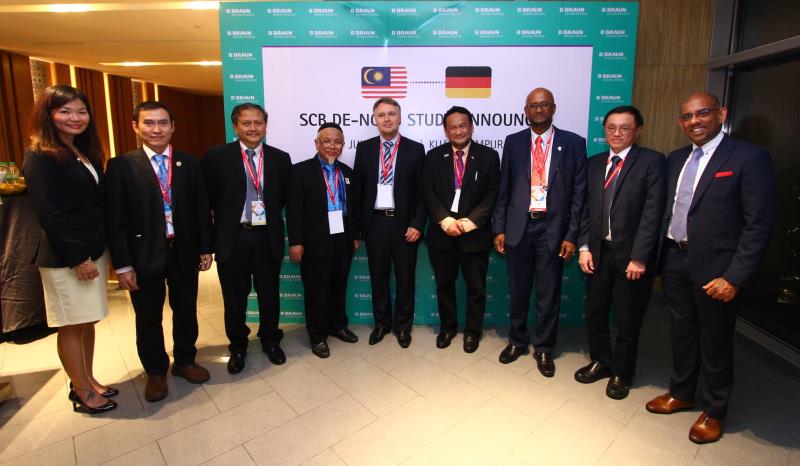 L-R: Zoey Hooi, Acting Business Unit Manager – Interventional Cardiology, B. Braun Medical Supplies; Dr Liew Houng Bang, Dato’ Dr Amin Ariff Nuruddin, Prof Datuk Paduka Dr Wan Azman Wan Ahmad, Prof Dr Bruno Scheller, Datuk Dr Rosli Mohd Ali, Dato’ Dr Muhamad Ali Sheikh Abdul Kader, Dr Ong Tiong Kiam, and Pallraj Armugum, Aesculap Division Asia Pacific regional head, B. Braun Medical Industries.
L-R: Zoey Hooi, Acting Business Unit Manager – Interventional Cardiology, B. Braun Medical Supplies; Dr Liew Houng Bang, Dato’ Dr Amin Ariff Nuruddin, Prof Datuk Paduka Dr Wan Azman Wan Ahmad, Prof Dr Bruno Scheller, Datuk Dr Rosli Mohd Ali, Dato’ Dr Muhamad Ali Sheikh Abdul Kader, Dr Ong Tiong Kiam, and Pallraj Armugum, Aesculap Division Asia Pacific regional head, B. Braun Medical Industries.A joint team of Malaysian and German cardiology experts will commence parallel first-in-man trials of a novel treatment for coronary de novo stenosis in patients with coronary artery disease (CAD).
The SCB (Sirolimus-Coated Balloon) DE-NOVO Study consists of two prospective randomized single-blind trials in Malaysia and Germany which aim to examine the safety and efficacy of sirolimus-coated versus paclitaxel-coated balloon catheters in coronary lesions not previously treated with angioplasty or stenting.
According to Prof Datuk Paduka Dr Wan Azman Wan Ahmad, head of the cardiac catheterization lab and senior consultant cardiologist at University Malaya Medical Centre (UMMC), while the 2014 ESC/EACTS* guidelines currently indicate drug-coated balloon (DCB) use only in cases of in-stent restenosis (ISR), positive evidence exists for their use in other situations such as de novo coronary lesions, small vessel disease, bifurcation lesions, or patients where dual-antiplatelet therapy (DAPT) may be a risky option.
The parallel studies will be conducted over a 1.5-year period under almost identical conditions in Malaysia and Germany, with the Malaysian side enrolling 70 patients across six public and private hospitals. The cohort will be divided in half with each receiving one of the two DCBs.
Inclusion criteria for the study are age >18 years, clinical evidence of angina or positive functional study, significant coronary de-novo stenosis—defined as ≥70 percent diameter stenosis or 50 to <70 percent stenosis with positive functional test or ischaemia symptoms—and successful lesion preparation. [FDA ClinicalTrials.gov NCT04017364]
Senior Malaysian cardiologists from each hospital will act as principal investigators in the Malaysian study. These include Wan Azman himself, Dr Liew Houng Bang, head of cardiology at Hospital Queen Elizabeth II, Sabah; Dato’ Dr Amin Ariff Nuruddin, head of cardiology at the National Heart Institute (IJN); Datuk Dr Rosli Mohd Ali of Cardio Vascular Sentral Kuala Lumpur; Dato’ Dr Muhamad Ali Sheikh Abdul Kader, head of cardiology at Hospital Pulau Pinang; and Dr Ong Tiong Kiam, head of cardiology at Sarawak General Hospital Heart Centre.
“As required by law, this clinical trial has received approvals from the Medical Research Ethics Committee of UMMC and the Research Ethics Committee of IJN,” said Wan Azman. “[The study] will use devices that already have the CE marking, which means that they have been approved for clinical use and are routinely used for treatment.”
At the official launch of the study was Prof Dr Bruno Scheller, consultant cardiologist, University Hospital of Saarland, Homburg, Germany. Scheller is one of the key developers of the DCB device and will also be leading the German arm of the trials.
“Germany is indeed pleased to collaborate with Malaysian doctors who have the most experience with DCB-only percutaneous coronary intervention (PCI) … having used DCB since SeQuent® Please was launched 10 years ago,” said Scheller. “We are confident that working with a similar team of investigators for this upcoming [study] will result in equal success with quality outcomes.”
The announcement was made in conjunction with the 16th Malaysian Cardiovascular Interventional Symposium (MyLIVE), organized by the Interventional Cardiovascular Society of Malaysia (ICSM).